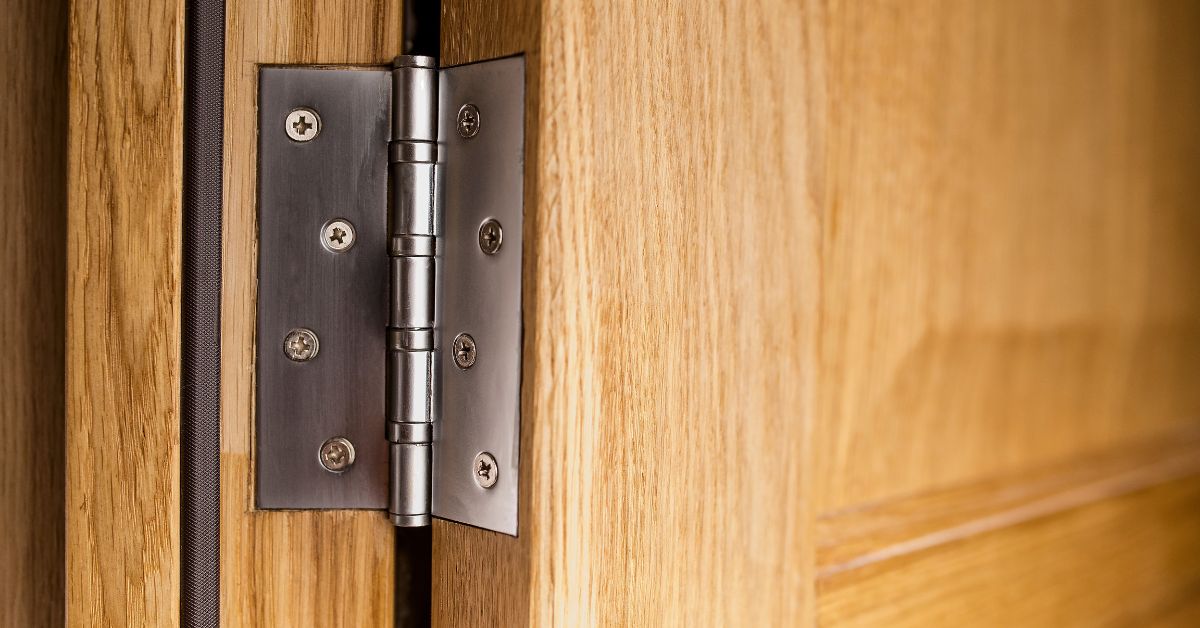Hinged vs. Pivot Commercial Doors: Which Should You Choose?

What Are Hinged Commercial Doors?
Design and Functionality
Hinges for doors attach to a frame and allow the door to swing open. You’re likely familiar with hinged doors as they appear in most office buildings, retail stores, and restaurants. These classic doors are versatile, functional, and easy to install, making them a go-to option for many commercial spaces.
Pros of Hinged Doors
Hinged doors provide an affordable and reliable option for businesses, with straightforward installation and low maintenance costs. They come in a wide range of styles, materials, and finishes, making it easy to customize their look to suit any space. For example, classic panel doors are ideal for most modern spaces, while double-hinged doors work well for high-traffic areas like hospitals or bustling restaurants.
Regardless of the type, hinged doors are known for their durability and can last for years with minimal upkeep. Plus, their versatility makes them ideal for various environments, from offices to retail spaces, where they offer privacy, sound insulation, and security. Additionally, hinged doors are compatible with a variety of hardware, such as locks and panic bars, enhancing their functionality and appeal across industries.
Cons of Hinged Doors
While hinged doors are practical and durable, they do come with some limitations. One of the main drawbacks is their need for additional space, as the swinging arc requires clearance. This can pose challenges in tight spaces like cramped offices, crowded coffee shops, or other areas with limited space.
Additionally, traditional hinged doors may not always align with the sleek, modern aesthetic desired in upscale commercial settings, potentially limiting their appeal. Over time, the hinges themselves can experience wear and tear, especially in high-traffic environments. To remain functional and secure, hinged doors require regular maintenance.

What Are Pivot Commercial Doors?
Design and Functionality
If you’re looking for a more modern, sophisticated aesthetic, pivot doors are the ones for you. Unlike hinged doors, pivot doors are attached with pivot hardware mounted at the top and bottom of the door. This creates a seamless, balanced mechanism where the door rotates on a central or offset axis.
Pivot doors are often seen in high-end commercial spaces like galleries, luxury boutiques, and chic office buildings. Their sleek, minimalist design makes them a great statement piece that maintains functionality.
Pros of Pivot Doors
Pivot doors have become a sought-after choice for modern commercial properties, offering a blend of style and practicality. Known for their striking aesthetic appeal, pivot doors exude a modern, luxurious look that leaves a lasting impression. Their unique design allows them to rotate on an axis, eliminating the need for a large swinging arc and making them ideal for narrow or uniquely shaped entryways.
Pivot doors are also highly versatile and available in a variety of sizes, including oversized options, that can serve as bold statement pieces in spacious areas. Additionally, their high-quality hardware ensures smooth and effortless operation—even for heavier door designs.
Cons of Pivot Doors
Like any design choice, pivot doors carry certain drawbacks you should consider. One notable downside is their higher cost, as the specialized hardware and customization options make them significantly more expensive to install than traditional hinged doors.
Additionally, the pivot mechanisms, while innovative, are more complex and may require regular maintenance to ensure seamless functionality over time. Another potential issue is the possibility of small gaps around the door edges, depending on the installation, which could affect energy efficiency and soundproofing.
Comparing Hinged and Pivot Doors
To help you make the right choice, take a look at this side-by-side comparison of hinged and pivot doors.
1. Aesthetics and Design Appeal
Designed for practicality, hinged doors fit seamlessly into most environments without drawing much attention. However, they may lack the visual impact required for premium commercial properties.
On the other hand, if yourbusiness prioritizes first impressions and design, pivot doors are unparalleled. When it comes to making bold architectural statements, pivot doors are an excellent choice.
2. Space Efficiency
Hinged doors require ample clearance to swing open, so they’re less practical for smaller areas. Since pivot doors rotate on a fixed axis and require less clearance, they’re better suited to tight spaces or unusual layouts.
3. Cost Considerations
Hinged doors are generally more affordable and widely available, with lower installation fees. Conversely, due to their specialized design and hardware, pivot doors have a higher up-front installation cost.
4. Functionality in High-Traffic Areas
The durability of hinged doors means they can handle frequent use, so they’re well-suited for high-traffic areas. Since pivot doors require precise installation, they can withstand heavy foot traffic. Plus, they’re less likely to warp or weaken under stress if constructed with robust materials.
5. Maintenance and Longevity
Though you must periodically inspect hinges for wear and tear, hinged doors are less complex and require minimal maintenance. On the other hand, pivot doors may need occasional servicing to maintain the alignment and functionality of the pivot hardware.

Which Commercial Door Is Right for You?
To choose the best door for you, simply assess your needs and priorities. Ask yourself the following questions before making a decision:
- What’s your budget? If you’re on a tight budget, hinged doors are the cost-effective choice.
- How important is design? If aesthetics and creating a premium look are crucial, pivot doors offer unmatched style.
- How much space is available? For smaller spaces or unique layouts, pivot doors have an efficient rotational mechanism you can use to your advantage.
- What’s the traffic volume? Consider how frequently and for what purpose your doors will be used. Hinged doors are durable and reliable for high-traffic areas, while pivot doors excel in lower-traffic, design-focused spaces.
Get Professional Help Selecting the Perfect Door
Choosing the right commercial door doesn’t have to be overwhelming. Both hinged and pivot doors have distinct strengths, and the best option will depend on your goals and space requirements.
Now that you’ve taken a closer look at the pros and cons of hinged versus pivot commercial doors, you can decide which door you should choose. Remember, a well-chosen door can elevate your commercial space, creating a welcoming entryway for clients and customers while meeting your practical needs.
Interested in upgrading your commercial space? Explore the materials available at DoorHub to take the first step toward creating an entryway that leaves a lasting impression.

Author
Michael Rega
Chief Marketing Officer and founding Member of DoorHub.com